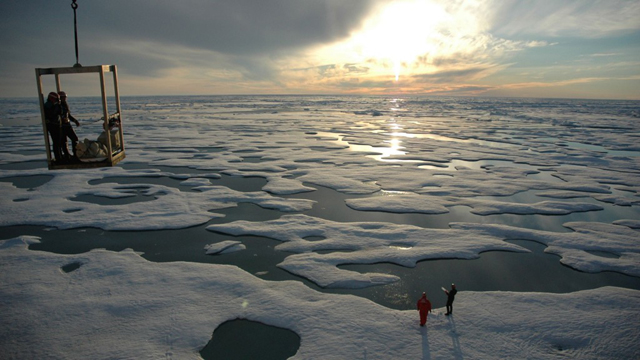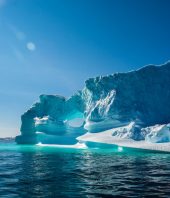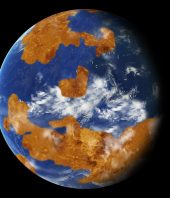As climate change warms the Arctic faster than the rest of the planet and the once ice-covered ocean is opening up, shipping concerns and oil and gas companies are moving in. With commercialization of the Arctic Ocean heating up, we’re coming to realize that we’re not prepared to deal with the likely disasters that will accompany it—especially oil spills.
Just last week, Russian oil company Gazprom Neft announced that it had shipped its first tanker of crude from the Arctic, a milestone in exploiting the massive reserves that could lurk under the ocean. The region could contain up to 22% of the world’s undiscovered oil and gas resources, a combined 412 billion barrels of oil and its equivalent in natural gas,according to the U.S. Energy Information Administration. The race to claim these undeveloped fields is already underway.
Despite the amount of effort sunk into exploration, little has been done to prepare for oil spills, according to a new report by the National Research Council. Much of what we know about oil spills comes from dealing with the disasters in warmer oceans, like the Gulf of Mexico. These regions not only have different thermodynamic properties from the Arctic—which helps disperse thick oil—but they also are surrounded by more infrastructure—the ports, ships, and supplies required to clean up the mess.
Carolyn Gramling, writing for ScienceInsider:
Cleaning up oil in the Arctic is particularly tricky for a number of reasons, the committee notes. The extreme weather conditions are one problem. The lack of many kinds of data—high-resolution topography and bathymetry along the coasts; measurements of ice cover and thickness; distributions in space and time of the region’s fish, birds, and marine mammals—is another. And if an emergency happens, there’s no infrastructure in place—no consistent U.S. Coast Guard presence and no reliable supply chains to support a rapid response.
On top of that, there haven’t been many spills in the Arctic Ocean, so we don’t know how oil reacts in its waters. Will deep spills stay trapped along the floor? How will surface ice influence where the oil spreads? And what about the microbes that often munch through crude in the water—how will they respond? The short answer to all of these is, we don’t know. There’s still lots more research to be done.
The Arctic is especially vulnerable to damage from human activities, the report points out. “The Arctic acts as an integrating, regulating, and mediating component of the physical, atmospheric and cryospheric systems that govern life on Earth,” its authors write. “Not only does the Arctic serve as regulator of many of the Earth’s large-scale systems and processes, but it is also an area where choices made have substantial impact on life and choices everywhere on planet Earth.”
Source: PBS
http://www.pbs.org/wgbh/nova/next/earth/were-not-ready-to-deal-with-oil-spills-in-the-arctic/






